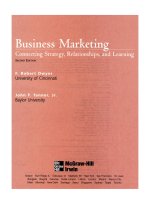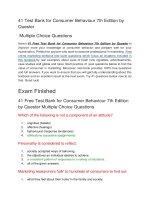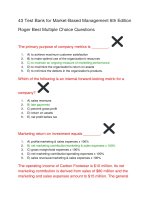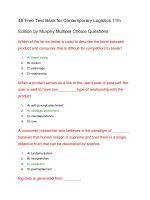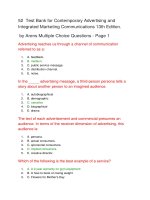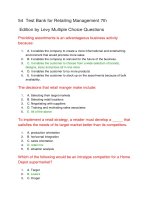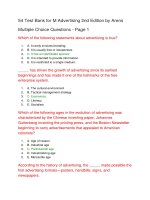55 free test bank with answers for business marketing connecting strategy relationships and learning 4th edition
Bạn đang xem bản rút gọn của tài liệu. Xem và tải ngay bản đầy đủ của tài liệu tại đây (72.24 KB, 14 trang )
55 Free Test Bank for Business Marketing Connecting
Strategy Relationships and Learning 4th Edition
by Dwyer Multiple Choice Questions - Page 1
All the following are ways in which business marketing differs from
consumer marketing EXCEPT:
1.
2.
3.
4.
5.
a. Its distribution channels are shorter and more direct
b. It emphasizes personal selling and negotiation
C. The Web is not integrated
d. It employs "unique" promotional strategies
e. It requires knowledge of the customer's customer
When purchasing products/services to be consumed in support of
the firm's operation, the firm is BEST described as a(n):
1.
2.
3.
4.
5.
A. User
b. Institution
c. Reseller
d. Government agency
e. Wholesaler
Increasingly, organizational survival depends upon firms being:
1.
2.
3.
4.
5.
a. Individual-driven
B. Market-driven
c. Ideology-driven
d. Product-driven
e. Sales-driven
Users are similar to final consumers in that:
1.
2.
3.
4.
5.
a. They purchase products to include in their own final product
B. Satisfaction is determined through consumption
c. They are primarily influenced by advertising
d. The impact upon profit is not important
e. They incorporate their purchases into their final product
These members of an organization are specifically responsible for
coordinating their company's efforts at satisfying their customers.
1.
2.
3.
4.
5.
A. Salespeople
b. Middle managers
c. Supervisors
d. Human resource personnel
e. First-line managers
When a company purchases a product or service to be included in
its own final product, the company is called a(n)
1.
2.
3.
4.
5.
a. Reseller
b. User
c. Institution
D. Original equipment manufacturer
e. Industrial distributor
Business marketers do NOT sell to:
1.
2.
3.
4.
5.
a. Other companies
b. Government bodies
c. Institutions
d. Service suppliers
E. Individual consumers
BASF salespeople work directly with fire departments to sell the
latest fire-fighting chemicals and ensure that they are used properly.
This example shows that business marketing is characterized by
_____ compared to consumer marketing.
1.
2.
3.
4.
5.
a. Longer distribution channels
B. Greater emphasis on personal selling
c. Varying buyer-seller relationships
d. Greater web integration
e. Consumption
Being _____ means that customer satisfaction and operational
efficiency are the order of the day for every department and
individual employee or associate.
1.
2.
3.
4.
5.
a. Product-driven
b. Profit-driven
c. Technology-driven
D. Market-driven
e. Sales-driven
In terms of personal selling, which of the following statements is
TRUE?
1.
a. A business cannot be successful through personally getting to know each
individual and coordinating the sales-purchase process
2. B. Complex buying procedures involving many members of the buying
organization require personal selling
3. c. Multiple personal relationships can strengthen organizational relationships
and these relationships are the responsibility of the manager
4. d. A customer's size and a direct channel do not affect the importance of
negotiation
5.
e. Large orders sold directly by the manufacturer to the user increase the
likelihood of negotiation because changes can be made in place and promotion
BASF sells fibers direct to Dupont for the manufacture of carpet and
through distributors to smaller companies. This example shows that
business marketing is characterized by _____ compared to
consumer marketing.
1.
2.
3.
4.
5.
A. Shorter distribution channels
b. Marketing research
c. Greater web integration
d. Consumption
e. Lesser emphasis on personal selling
Why is the demand for business products dependent ultimately on
individual consumers?
1.
2.
a. Because individual consumers are larger than business customers
b. Because individuals within organizations purchase for personal
consumption and consumers do not
3. C. Because business markets consume products in the process of making
other products
4. d. Because the buyers of business products are the final consumers
5. e. Because of the emphasis on personal selling for business products
Which of the following statements about buyer-seller relationships
in business marketing is TRUE?
1.
2.
3.
4.
5.
a. Strong personal and business relationships between buyer and seller are
extremely rare
b. Close personal relationships exist between buyer and seller in all industries
c. Personal selling is never an important element of the marketing mix
d. Companies rarely enter into long-term contracts as the opportunity cost of
mistakes is high
E. Many companies focus on building relationships that enable buyers and
sellers to plan jointly
In business marketing, large customer size and use of direct
channels increase the importance of:
1.
2.
3.
4.
5.
a. Advertising
b. Distribution
C. Negotiation
d. Packaging
e. Production
Government agencies tend to have complex purchasing processes
because purchasing is:
1.
a. Limited to military goods
2.
3.
4.
5.
b. Solely designed to produce profits
c. Solely for their own use
D. Often designed to accomplish social objectives
e. Largely influenced by negotiation
Identify the largest single purchaser of products and services in the
United States.
1.
2.
3.
4.
5.
a. Wal-Mart
b. Defense department
C. Government
d. Financial institutions
e. Steel industry
OEMs are BEST described as:
1.
2.
3.
4.
5.
a. End users
B. Companies that consume
c. Government agencies
d. Firms that resell a product without making any changes
e. Institutions
_____ means that at many organizations, individuals with
complementary expertise and skills work in teams to constantly
strive to serve organizational customers better, to innovate and to
develop the means to approach new institutional markets.
1.
2.
3.
4.
5.
a. Product-driven
b. Profit-driven
c. Technology-driven
D. Market-driven
e. Sales-driven
Which of the following is NOT a valid reason for studying business
marketing?
1.
2.
3.
4.
5.
a. The magnitude of business marketing
b. Business marketing is unique
c. One type of marketing does not fit all situations
d. It is an exciting area of study
E. It is the same as consumer marketing
All the following types of customers purchase products for
consumption EXCEPT:
1.
2.
3.
4.
A. Brokers
b. Original equipment manufacturers
c. Hospitals
d. Universities
5.
e. Users
In the United States:
1.
2.
3.
a. The state governments are the single largest consumers
b. The government does not use any product it buys
c. The purchasing processes used by the government are simple and easy to
sell to
4. d. The federal government is the only government customer
5. E. The federal government is the country's largest single landlord
Resellers include all of the following EXCEPT:
1.
2.
3.
4.
5.
a. Wholesalers
b. Dealers
C. Government agencies
d. Brokers
e. Industrial distributors
55 Free Test Bank for Business Marketing Connecting
Strategy Relationships and Learning 4th Edition by
Dwyer Multiple Choice Questions - Page 2
Products purchased for use in the firm's operations are usually
called:
1.
2.
3.
4.
5.
a. OEM parts
b. Capital goods
c. Accessory equipments
D. MRO items
e. Component parts
As one moves further away from the consumer market, derived
demand can cause wide swings in demand, called
1.
2.
3.
4.
5.
a. Inelasticity
B. Volatility
c. Make-or-buy
d. Deficiency
e. Dissolution
Raw materials
1.
2.
3.
A. Are sold to OEMs for use in the products they manufacture
b. Are parts assembled into the final product without further transformation
c. Facilitate a firm's achievement of its objectives, but are not part of the final
product
4. d. Are also called installations
5. e. Are products sold to users for use in the company's operations
A key raw material for technology-driven companies is:
1.
2.
3.
4.
5.
a. MRO item
B. Personnel
c. Steel
d. Accessory equipment
e. Location
Value is equivalent to _____ for the buyer.
1.
2.
3.
4.
5.
a. Product
b. Price
C. Profit
d. Distribution
e. Cost
Typically, business marketers face:
1.
2.
3.
4.
5.
a. Hypothetical demand
b. Highly elastic demand
C. Derived demand
d. Latent demand
e. Primary demand
In business markets, products are generally classified on the basis
of:
1.
2.
3.
4.
5.
a. Price
b. Durability
C. Type of purchaser and reason for purchase
d. Size and weight of product
e. Type of promotion employed
Industrial products having no substitutes typically face:
1.
2.
3.
4.
5.
A. Inelastic demand
b. Volatile demand
c. Elastic demand
d. Stable demand
e. Unitary demand
Computers used to facilitate the company's achievement of its
objectives, but not part of the final product would be BEST
described as:
1.
2.
3.
4.
5.
a. OEM parts
b. Component parts
C. Accessory equipment
d. Raw materials
e. Subassembly
Facilitating supplies:
1.
2.
3.
a. Are also called OEM products
b. Refer to products sold to users for use in the company's final product
c. Are materials processed only to the point required for economic handling
and distribution
4. d. Are parts assembled into the final product without further transformation
5. E. Support company efforts but are not part of the final product
Business marketers must recognize that the demand for their
products and services is _____ demand, which means that demand
for their products and services results from the demand for their
customers' products and services.
1.
2.
3.
4.
5.
A. Derived
b. Concentrated
c. Limited
d. Direct
e. Conditional
Parts that may be assembled into a final product without further
processing are BEST described as:
1.
2.
3.
4.
5.
a. Capital equipment
b. Manufactured materials
c. Raw materials
d. MROs
E. OEM parts
_____ is something that provides incremental value when
compared to other offerings.
1.
2.
3.
4.
5.
A. Competitive advantage
b. Value chain
c. Volatility
d. Demand elasticity
e. Derived demand
The percentage change in sales relative to the percentage change
in price is:
1.
2.
3.
4.
5.
a. Volatile demand
b. Market demand
c. Final demand
D. Demand elasticity
e. Price elasticity
Gold purchased by AT&T for use in the manufacture of
telecommunications equipment would be BEST described as a(n):
1.
2.
3.
4.
5.
A. Raw material
b. Facilitating supply
c. Manufactured material
d. Component part
e. MRO
Marketing is BEST described as a(n) _____ process.
1.
2.
3.
4.
5.
a. Sales
b. Profit-maximizing
c. Cost-minimizing
D. Integrative
e. Internal
Policies designed to encourage the growth of minority- or womenowned businesses as well as small businesses are examples of
_____ policies that influence government purchasing.
1.
2.
3.
4.
5.
A. Social objective
b. Environmental objective
c. Economic objective
d. Business objective
e. Protectionist
Compared to the typical household buying, the organizational
purchasing process:
1.
2.
3.
4.
5.
a. Involves lesser number of people
b. Rarely involves checks and controls
c. Arises from implicit negotiation, expertise and habit
D. Is more complex
e. Uses crude cost accounting systems and cash flow management
Which of following business customers provide services similar to
those delivered by wholesalers and retailers of consumer goods?
1.
2.
3.
4.
5.
a. OEMs
b. Government agencies
c. Institutions
d. Private contractors
E. Industrial distributors
Janitorial products, painting contractors who paint the buildings,
plumbing services and heating and air conditioning services fall
under:
1.
2.
3.
a. MRO items
b. Repair services
C. Maintenance products
4.
5.
d. Capital equipment
e. Accessory equipment
Sometimes, a company purchases OEM parts and assembles
these to make a component for installation into the final product by
another company. The component may then be called a(n)
1.
2.
3.
4.
5.
a. Facilitating product
b. Manufactured material
c. Installation
D. Subassembly
e. MRO item
Which of the following product types has been transformed from the
raw material and requires further processing before use?
1.
2.
3.
4.
5.
a. OEM
B. Manufactured material
c. Component part
d. Capital equipment
e. MRO
What is an important difference between accessory and capital
equipment when it comes to marketing the equipment to users?
1.
2.
3.
4.
5.
a. Accessory equipment is part of the organization's final product while capital
equipment facilitates the organization's activities
B. Capital equipment is much more expensive and its purchase may involve
more members of the organization than purchase of accessory equipment
c. Accessory equipment demand is derived from the demand for consumer
products
d. Marketing requirements for accessory equipment are different as more
members of the organization must be reached by marketing efforts
e. Capital equipment is ordered on a more regular basis than accessory
equipment
Compared to individual consumers, business customers:
1.
2.
3.
4.
5.
a. Have less stringent standards for judging a vendor
b. Are more in number
C. Are more likely to be geographically concentrated
d. Have lower purchasing power
e. Are less important to the financial success of the business marketer
The system of value creation is also known as:
1.
2.
3.
4.
a. Organizational value
b. Quality process
C. A value chain
d. Competitive advantage
5.
e. Core competency
Value
1.
2.
a. Is equivalent to profit for a seller
B. Is the perception of how much the buyer benefited beyond what was
invested in a product
3. c. Is the reason why an organization is created
4. d. Is based on some general need that has been identified in the market
5. e. Is the recognition of a need and the means to satisfy it
The hiring of an advertising agency would be BEST descried as the
purchase of a(n):
1.
2.
3.
4.
5.
a. Operating supply
B. Facilitating service
c. Component part
d. MRO
e. Accessory
Gates Controls may purchase plastic casing, a component part,
from Plastech and parts from Metric Devices and then put these
components together into a tachometer that is sold to GM. GM
would then put the tachometer into its cars or trucks. GM may refer
to the part as a(n)
1.
2.
3.
4.
5.
A. Assembly
b. Manufactured material
c. Accessory equipment
d. Capital equipment
e. MRO item
Overhead cranes, blast furnaces, industrial robots and other
manufacturing equipment as well as forklifts, road graters and other
heavy construction machinery are examples of
1.
2.
3.
4.
5.
a. MRO items
b. Maintenance products
c. Manufactured materials
d. Accessory equipment
E. Capital equipment
Marketing is a process by which the marketer creates:
1.
2.
3.
4.
5.
a. Derived demand
b. Vision
C. Value
d. Volatility
e. Service
Facilitating products:
1.
2.
3.
4.
5.
A. Aid the company's achievement of its objectives, but are not part of the final
product
b. Are parts assembled into the final product without further transformation
c. Include raw and manufactured materials, component parts or OEM parts
and assemblies
d. Are parts assembled to make a component for installation into the final
product by another company
e. Are parts assembled into the final product without further transformation
Large, expensive items used in the production process are BEST
classified as:
1.
2.
3.
4.
5.
A. Capital equipment
b. OEMs
c. Accessory equipment
d. MROs
e. Manufactured materials
All of the following are part of the marketing mix EXCEPT:
1.
2.
3.
4.
5.
a. Product
b. Promotion
c. Place
D. Process
e. Price
